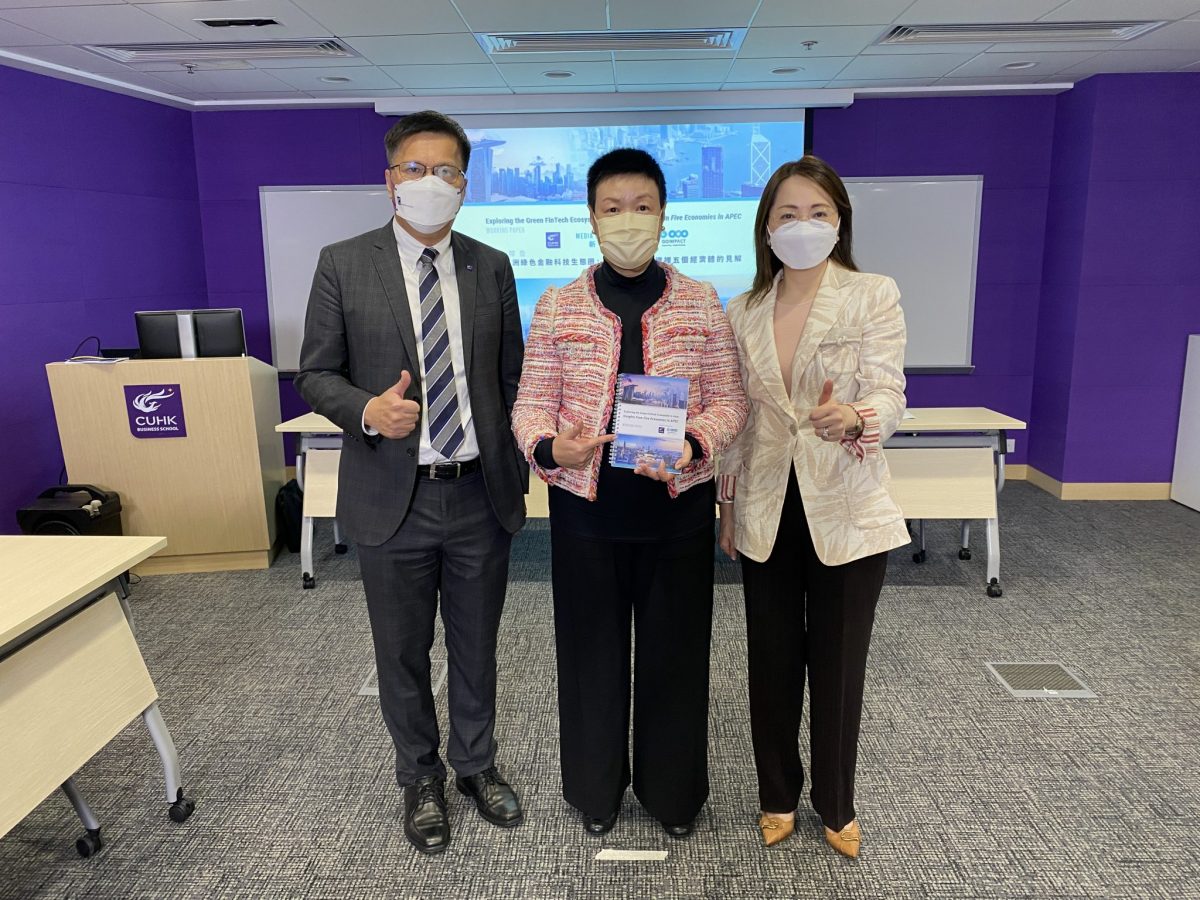Hong Kong and Singapore Lead Green Fintech Development Among the Five Economies in APEC

Study finds government support and talent development are crucial in driving the growth of green fintech.
Today, GoImpact, an ESG and Sustainability education firm, together with The Chinese University of Hong Kong’s (CUHK) Business School released the findings from their working paper, Exploring the Green Fintech Ecosystem in Asia: Insights from Five Economies in APEC. This study finds that government support plays a vital and essential role in facilitating green fintech development, while talent shortage is a common concern in the five economies in the region.
Derived from three elements — environment, finance, and technology — the industry report defines green fintech as financial activities that utilise green technologies that bring better environmental outcomes.
Industry experts from five APEC economies, namely Hong Kong SAR, China (“Hong Kong”), Indonesia, the Republic of Korea (“Korea”), Singapore and Thailand, have urged policymakers to establish a conducive environment for green fintech to flourish. According to them, governments can help through offering incentive schemes for startups to develop in this area and spearhead the change by setting sustainable regulatory frameworks and mandating disclosures, reporting, and thresholds.
The study also suggests that financial institutions should embrace the sustainable agenda to achieve the triple bottom line: profit, people, and the planet. Given the current competitive banking environment and the global shortage of green talent, financial institutions should utilise their unique positions in the business ecosystem to develop more in-house sustainability talent to promote the sustainability agenda, the report further explains.
Key findings from the study include the following:
- Green fintech startups in Asia have already provided many different types of green fintech, such as green digital payment, green digital investment solutions, digital green analytics, green crowdfunding, green risk analysis, green digital lending, green digital asset solutions, and green regtech.
- Regulations on ESG disclosure play an important role in advancing the green fintech ecosystem. Supporting evidence comes from case examples in Hong Kong SAR that suggest that green reporting startups grew at a faster pace since the requirement of ESG reporting for all listed companies came into effect in 2020.
- As the Green FinTech ecosystem develops, cooperation and partnerships will become more mainstream. There are already several successful collaborations in Asia, including Project Genesis in Hong Kong SAR, Climate Impact X and Project Greenprint in Singapore, and a carbon offsetting program by Gojek and Jejak.in in Indonesia.
- Governments in Asia are aware of the importance of a green economy and have set roadmaps and initiatives to help the economy transition into a more sustainable one: for example, The Republic of Korea’s Green New Deal and Thailand’s Sustainable Finance Initiatives.
- Financial institutions have already provided several green fintech services, including biodiversity-screened equity indices, tokenised carbon credits trading platforms, robotic platforms for ESG investment, green certificates, and ESG credit rating systems.
- Sustainability-related education is imperative to building a mature green FinTech ecosystem. It will raise awareness, push the demand for green finance, and cultivate the talent needed for green FinTech Development in Asia.
- The four-pronged approach required to build a well-functioning green FinTech ecosystem is: boost demand for green services; increase supply of green services; mobilise resources; and strengthen policies.
The study examined policies, markets, and opportunities regarding fintech’s role in driving green finance in the five selected APEC economies through desk research, interviews, as well as focus group discussions involving green fintech startups, government and quasi-government organisations, green fintech-related associations, and financial institutions, and found that both Hong Kong and Singapore are in the stage of scaling up and accelerating to mature levels in terms of green fintech development compared to the past two years.
Prof. Kalok Chan, Wei Lun Professor of Finance at CUHK Business School, said, “It is our great pleasure to partner with GoImpact to explore the Green Fintech ecosystem in Asia. This research paper offers a glimpse of trends and insights for the five Asian economies in terms of Green Fintech Ecosystem health, government initiatives and supporting institutions. As one of the leading business schools in Asia, we will also continue cultivating talents with a socially responsible mindset and equipping them with the skills and knowledge to make a positive impact for the betterment of the Green Fintech industry.”
Ms. Helene Li, CEO and Co-Founder of GoImpact, said, “The intersection of Capital and Technology is the sweet spot driving the adaptation of Sustainability. We are proud to partner with CUHK Business School on this study that aims to bring a better understanding of the diverse landscape in Asia and a more collaborative lens in working together on this timely agenda.”
Li will speak about adopting an active ESG approach for inclusive and green finance at the 2022 Hong Kong Fintech Week on 31 October 2022 to share more insights on the global fintech industry.
 (Left to right) Prof. Kalok Chan, Wei Lun Professor of Finance at CUHK Business School and Ms. Helene Li, CEO and Co-Founder of GoImpact, present their first joint working paper “Exploring the Green Fintech Ecosystem in Asia: Insights from Five Economies in APEC”; and pose for a photo with Ms. Jennifer Tan, EVP, Strategy Development & Government Affairs, GBA of Ant Group, the corporate partner of the study.
(Left to right) Prof. Kalok Chan, Wei Lun Professor of Finance at CUHK Business School and Ms. Helene Li, CEO and Co-Founder of GoImpact, present their first joint working paper “Exploring the Green Fintech Ecosystem in Asia: Insights from Five Economies in APEC”; and pose for a photo with Ms. Jennifer Tan, EVP, Strategy Development & Government Affairs, GBA of Ant Group, the corporate partner of the study.
Download Information
The Full Report of Exploring the Green Fintech Ecosystem in Asia is available for download from this link.
About GoImpact
Bridging the great divide between the talk and action, accelerating the Sustainable Development agenda from intention to implementation – GoImpact means impact made easy and actionable.
GoImpact is an ecosystem developed to connect the dots and provide action enablers built around 3 key pillars – GoLearn (education); GoNetwork (structured advocacy); GoInvest (deal flow platform for sustainable investments).
Through our integrated learning platform in partnership with top tier education institutions and accreditation channels, we seek to establish a common baseline of Sustainability learning, made easy, for many.
Website: www.goimpact.today/home
About CUHK Business School
CUHK Business School comprises two schools – Accountancy, and Hotel and Tourism Management – and four departments – Decision Sciences and Managerial Economics, Finance, Management, and Marketing. Established in Hong Kong in 1963, it was the first business school to offer BBA, MBA and Executive MBA programmes in the region. Today, CUHK Business School offers 10 undergraduate programmes and 20 graduate programmes including MBA, EMBA, Master, MSc, MPhil, DBA and Ph.D. The School currently has over 4,600 undergraduate and postgraduate students from over 20 countries/regions.
In the Financial Times Executive MBA Ranking 2022, CUHK EMBA was ranked 24th in the world. In Financial Times Global MBA Ranking 2022, CUHK MBA was ranked 50th. CUHK Business School has the largest number of business alumni (over 40,000) among universities/business schools in Hong Kong – many of whom are key business leaders.

